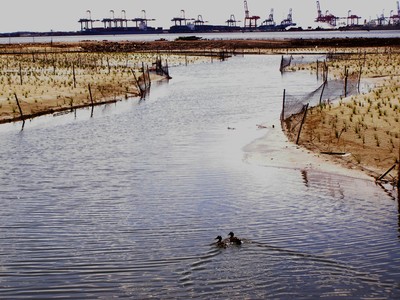During the Vietnam War, Occidental Chemical Company – with operations located along the Passaic River in Hudson and Passaic counties – provided the military with a chemical called “Agent Orange.” This was a powerful defoliant that allowed the military to clear vast jungle areas to eliminate places where the enemy might be located.
Unfortunately, Agent Orange also came with some serious medical side effects that haunted American troops for decades.
Soldiers in the remote jungles were not the only people at risk of exposure. Residents living around the Passaic River also faced a risk since some of the Agent Orange spilled into that waterway during manufacturing.
The New Jersey Department of Environmental Protection has been seeking to get the company to clean up the toxic waste, and though several agreements have been reached over the last few years, the state has been forced to sue three companies to get action.
New Jersey filed suit against Occidental Chemical Corporation, Maxus Energy Corporation and Tierra Solutions Inc. for the intentional discharge of dioxin – an extremely dangerous, cancer-causing chemical – and other contaminants into the Passaic River.
New Jersey also ordered the three companies to pay the state $2.3 million to develop a plan to dredge contaminated sediments in a six-mile stretch of the Lower Passaic River that includes a portion of Essex and Hudson counties near Newark, Harrison, East Newark and Kearny.
In turn, the companies are suing the municipalities along the Passaic River because most, if not all, dumped sewage into the river for many years before state and federal laws clamped down on the practice.
Unfortunately, the city of Bayonne also has been included in this lawsuit, and according to Steve Gallo, executive chairman of the Bayonne Municipal Utilities Authority, this isn’t fair.
Occidental Chemical Corporation discharged chemicals into the waterway from its Newark plant and, according to the DEP, the high concentrations of dioxin in sediment within the six-mile area is an ongoing source of contamination to other areas of the river and the NJ/NY harbor estuary – including Newark Bay, which borders Bayonne.
The Passaic and Hackensack rivers both empty into Newark Bay, so the pollution from them is carried on to Bayonne’s shores and beyond.
Bayonne came after
While Bayonne has water and other agreements with the Passaic Valley Sewerage Authority – one of the entities being included in the lawsuit – Gallo said Bayonne forged these agreements well after new environmental precautions were taken.
“What was released into the Passaic River after we joined was clean enough to drink,” Gallo said. “We’re asking to get removed from the suit since we were not part of the problem.”
The federal Environmental Protection Agency determines that this dioxin is “one of the most toxic chemicals ever developed by man.”
According to a statement issued by the state DEP, “Human exposure to dioxin at extremely low concentrations can cause severe health effects, including cancer and reproductive damage,” and that “the dioxin (TCDD) contamination associated with Occidental Chemical Corporation’s operations has been found in the sediment of the six-mile stretch of the Lower Passaic River … and its continued migration has created one of the largest and most toxic contaminant discharges in the world.”
Concentrations of dioxin found in Passaic River fish and crabs are among the highest reported in the world, the DEP report said, and this presents “an imminent and substantial danger to the public and wildlife.”
While the state has imposed a ban on consuming fish and crabs from the river for more than 20 years, many people still eat them.
The DEP is developing a dredging plan to keep the contamination from spreading any more than it has, but it wants these companies to pay the costs for the cleanup.
“This isn’t fair for other communities that have been included in the suit – such as Kearny, Harrison and East Newark.” – Steve Gallo
________
Confident
Bayonne does operate property in Kearny as part of its water access routing, but none of its sewerage releases of the past had any impact on the six miles of Passaic River that are named in the suit.
“We feel confident that we will prevail. This isn’t fair for other communities that have been included in the suit – such as Kearny, Harrison and East Newark,” Gallo said. “They can’t possibly afford to pay the cost of cleaning up the river – and frankly, they shouldn’t have to.”
Riverkeeper Bill Sheehan said his organization had been poised to file suit against the chemical companies in 2003. But the Bush Administration stepped in, promoting areas in Newark Bay and the Hackensack River – including portions of Bayonne, Jersey City and Secaucus – in a federal Superfund cleanup study.
Under federal law, private organizations are prohibited from filing lawsuits in regard to Superfund sites.
“We always knew when the moment came and we brought the hammer down on them, they would try and drag in all the others,” he said. “It is cheaper for them to stretch this out for another 20 years than to clean it up.”
Although the original Superfund site only affected a six-mile stretch along the Passaic River and tip of Newark Bay, tidal flow has spread it up the Hackensack River through Jersey City to Secaucus and the length of Newark Bay into the various waterways along Bayonne, Staten Island and Elizabeth.
But Sheehan said there is hope on the horizon because Lisa Jackson, former director of the state’s DEP – and the person who prepared the lawsuit against the chemical companies – now heads the federal EPA, which is expected to take bold steps to get the situation resolved.
